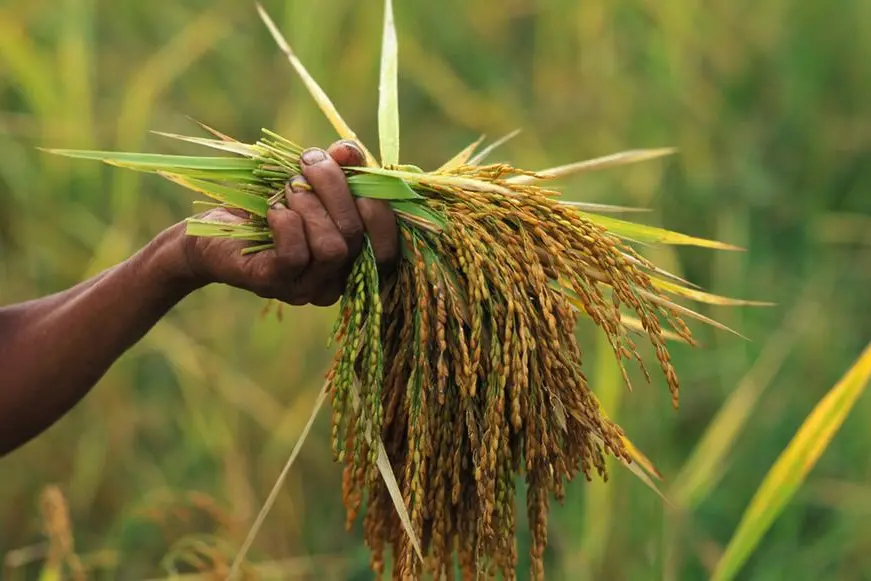PHOTO
The government is planning to import 1.3 million metric tons (MMT) of rice as President Marcos expressed concerns over the combined impact of Typhoon Egay, the El Niño phenomenon and Russia's withdrawal from the Black Sea Grain initiative on the country's supply of the grain, an official said yesterday.
During a Palace briefing, Agriculture Undersecretary Mercedita Sombilla said they have yet to set the dates of importation, but noted there are pending applications for sanitary and phytosanitary certificates.
'I think the President will have to discuss or consult the private sector for help. I think we need the help of the private sector in situations like these,' she said.
Marcos, who also serves as agriculture secretary, said the agency has enough buffer stock of rice despite the damage left by Egay in Northern Luzon.
The President met with officials of the Department of Agriculture (DA) at Malacañang yesterday, a few days after Egay devastated the north.
Egay left approximately P1.94 billion worth of damage to agriculture.
Sombilla said the supply and demand of rice in the country remain reliable so far.
Marcos said the goverment is looking at some 'agricultural inputs' to ensure that prices of rice in the market will not increase.
With rice supply projected to reach 5.47 MMT in the third quarter of this year and demand at 3.79 MMT, ending stock in the third quarter is projected at 1.69 MMT, which is enough for 45 days based on present consumption, the DA said.
Aside from the effects of the super typhoon, Marcos said that government's preparations for the buffer stock with regard to the impact of El Niño was also discussed during the meeting.
'In our discussion, we saw that our rice imports are going down. In an emergency like this, we need to see if we still need to import,' Marcos said, adding importation must be studied carefully.
The possibility of immediate procurement of available rice stocks at the lowest accessible price to cover the 15-day buffer stock is among the recommendations presented by the DA to Marcos.
Amid the effects of the three global issues, Sombilla said the DA is ready to increase the country's rice production.
'The largest rice production will still come, if not by end of September, it will be sometime in October. We will be beefing up our supply,' she said.
She said the decision of Russia to withdraw from the Black Sea grain initiative would have 'minimal effect' on the Philippine market, similar to the effect of the decision of India to ban rice exports.
As these developed, House deputy speaker Ralph Recto warned that the Philippines may experience severe rice shortage due to the typhoons and the decisions of some rice producing countries to prioritize local consumption.
Recto described as a 'quadruple whammy' the impact of the decision of India to ban rice exports, Vietnam's move to cut its exports by half and the scuttling of the Ukraine grain deal as well as the typhoons.
'These developments are the sound of empty pots clanging,' Recto said, noting the Philippines remains the world's second and sixth largest rice and wheat importer. 'This will really be a strong jab on our stomachs and we should all prepare for this,' he said. 'You don't need a Nobel to sagely predict that it will have a ripple effect on all grain prices considering the big hole it will cause.'
Recto warned the public that what could hit the Philippines 'directly and painfully' is Vietnam's decision to slash its rice exports to four million tons by 2030 from 7.1 million tons in 2022.
He said the floods spawned by Typhoons Egay and Falcon would adversely affect the supply chain as these battered three regions: Ilocos, Cagayan Valley, Central Luzon.
'It would impact rice and corn supply as the affected regions account for 44 percent of the national rice production and 79 percent of corn,' he said.
Recto suggested that rice and substitute crops should be produced in areas hardly hit by storms, like Mindanao.
Vegetables
Retail prices of vegetables in local markets have increased by as much as P30 per kilo as the agriculture sector incurs over P1.69 billion in losses due to Egay.
Kristine Evangelista, spokesperson for the DA, said they have seen vegetable prices go up by around P20 to P30 in retail markets, and P10 in government-run Kadiwa centers.
Evangelista said the flow of vegetables to wholesale distributors and retailers was also affected by the typhoon.
She said local government units have been urged to put up more Kadiwa centers to bring in more affordable commodities for their residents.
Copyright © 2022 PhilSTAR Daily, Inc Provided by SyndiGate Media Inc. (Syndigate.info).





















